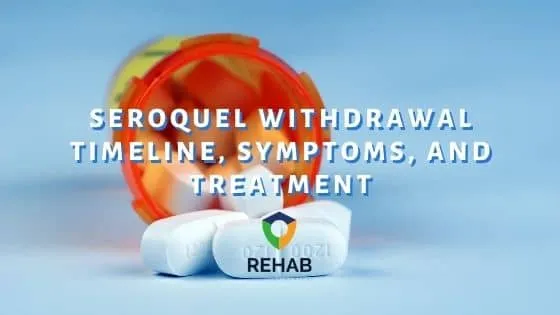Table of Contents
Seroquel is the brand name for a drug known as quetiapine, an antipsychotic medication. This medication is approved for use in the treatment of schizophrenia and bipolar disorder. However, it has many off-label uses such as treating insomnia, anxiety, psychosis, and even depression.
When someone is prescribed Seroquel, their body will become dependent on the medication. It is also important to note that individuals may develop an addiction to this drug if they abuse it. In either case, abruptly discontinuing the use of Seroquel will cause individuals to experience symptoms of withdrawal.
Because of the way that quetiapine affects the central nervous system, the effects of abruptly quitting the use of this medication can be dangerous. Because of this, consulting with a doctor or attending a medical detox program is the best way to cope with Seroquel withdrawal.
Do You Have to be Addicted to Seroquel to Experience Withdrawal?
Many people believe that only narcotic prescription medications can cause individuals to develop an addiction. However, even antipsychotic medications like Seroquel can be abused and addictive. According to studies, quetiapine is the most commonly abused antipsychotic due to its hypnotic and euphoric effects.[1]
Individuals who become addicted to Seroquel will experience symptoms of withdrawal if they cut down on or completely stop their consumption of this drug. However, people who take this drug according to their doctor’s instructions will also experience the same symptoms of withdrawal.
In other words, individuals do not have to be addicted to Seroquel to experience withdrawal. Anyone who takes the drug regularly, even as prescribed, may develop a physical dependence on it. Physical dependency does not indicate an addiction unless psychological dependency is present as well.
Whether someone is addicted to quetiapine or simply physically dependent on the medication, stopping this drug abruptly is dangerous. The symptoms of withdrawal can become severe and life-threatening without proper medical intervention.
The Symptoms of Seroquel Withdrawal
Concerningly, many people search “how to deal with Seroquel withdrawal” despite the warnings of abruptly discontinuing the medication.
Quetiapine should never be stopped cold turkey because of the strong effects it has on the central nervous system and its functions. The medication regulates histamine, dopamine, serotonin, and norepinephrine levels. When someone abruptly stops taking it, these important brain chemicals are greatly affected, causing an array of severe withdrawal symptoms.
The symptoms of quetiapine withdrawal include:
- Itchy red skin
- Shortness of breath
- Nausea and vomiting
- Insomnia
- Dehydration
- Fatigue
- High anxiety
- Depression and suicidal thoughts
- Rapid weight loss or gain
- Issues in eyesight
- Kidney problems
- Low sex drive hallucinations
- Low appetite
- Frequent urination
How Long Does Withdrawal Last?
The Seroquel withdrawal timeline depends on a variety of factors, including an individual’s age, biological sex, personal health, and the dosage and duration of use. Additionally, the method of withdrawal plays a role in how long and how severe the symptoms of withdrawal will be. For example, quitting cold turkey could take longer and cause more severe symptoms while attending a detox program could provide a better experience.
Seroquel is metabolized by an individual’s body about 14 to 15 hours after their last dosage. As a result, the drug will be completely rid of their body about 24 hours after their last dose.[2] This is when the withdrawal symptoms will begin.
While the symptoms of withdrawal can last anywhere from a few hours to several weeks, the average length individuals experience symptoms is about 14 days. Any symptoms that last longer than 6 weeks are referred to as persistent post-withdrawal syndrome.
With that being said, coping with the symptoms of quetiapine withdrawal can be extremely difficult. For individuals who were addicted to the medication and abusing large amounts of Seroquel, the symptoms could become life-threatening without a medical detox program.
What to Expect During Detox for Seroquel Withdrawal
If an individual suffers from an addiction to Seroquel, attending a medical detox is vital for their safety. Most people who are addicted to this substance take extremely large doses or mix Seroquel with other drugs like alcohol or benzodiazepines. Due to this, the symptoms of withdrawal they could experience require 24/7 monitoring, medication management, tapering treatments, and access to life-saving medical treatments.
A medical detox program may treat the symptoms of Seroquel withdrawal by:
- Monitoring vital signs consistently to ensure medical safety
- Tapering patients off of Seroquel by lowering their dosage over time to prevent symptoms of withdrawal
- Providing patients with medications that soothe symptoms of withdrawal like nausea, insomnia, anxiety, or suicidal thoughts
- Offer mental health support for patients who suffer from psychological symptoms of withdrawal or intense cravings to abuse quetiapine
- Provide access to 12-step recovery meetings to help patients get a head start on the addiction recovery process
- Give patients referrals to inpatient or outpatient addiction treatment programs
Finding Help for Seroquel Dependency, Abuse, and Addiction
While Seroquel is a life-saving medication that can help treat mental health conditions like schizophrenia and bipolar disorder, it can also cause dependency and addiction. Individuals who abuse this medication are at an increased risk of suffering from an overdose, engaging in polysubstance abuse, or struggling with life-threatening symptoms of withdrawal.
If you or a loved one suffer from a dependency or an addiction to Seroquel, a medical detox program can help you. Contact Rehab Recovery Services to find a detox or treatment center near you.
References:
Get Help Today
Don’t go through the process of recovery alone. There are people who can help you with the struggle you’re facing. Get in touch with one today.


